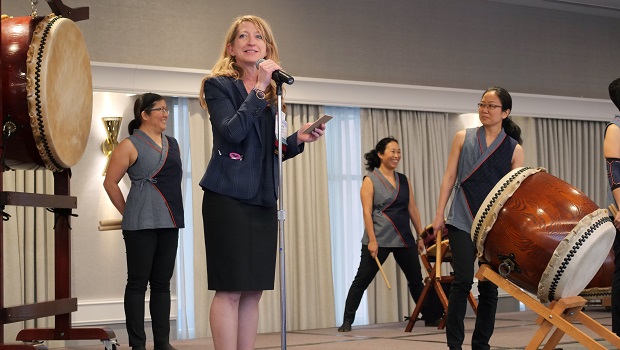HCSRN's 25th anniversary promotes enduring partnerships

Attendees of the 2019 Health Care Systems Research Network conference discussed data sharing, gender equality, new papers, and much more.
By Sarah Greene, MPH, executive director of the Health Care Systems Research Network
The 25th Annual Conference of the Health Care Systems Research Network (HCSRN) wrapped earlier this month. I wrote this recap while sitting in a coffee shop, and on the wall, I noticed a huge piece of only-in-a-coffee-shop art that says, “Pour Your Heart into It.” That’s a pretty accurate summary of the HCSRN Conference: We were replete with great ideas, commitment to try different things, and a shared goal of making the HCSRN’s “silver anniversary” conference one to remember.
HCSRN, a consortium of 18 research centers affiliated with community-based health delivery systems in the United States and Israel, represents nearly 2,000 scientists with expertise in such subjects as epidemiology, economics, trials, genomics, disparities, outcomes, and quality assessment. We opened the conference with a welcome from co-founder Dr. Mitch Greenlick, who reflected on our track record of success, and encouraged us to keep striving for many more years of relevant and impactful research. It’s amazing to realize that the HCSRN was “born” as the HMO Research Network in a conference room in Kaiser Permanente Northwest’s Center for Health Research (which Dr. Greenlick also founded), and we found ourselves back in Portland again with 420 attendees — and a much larger venue.
Following Dr. Greenlick’s remarks, we jumped into a provocative opening session on the intersection between data science and health systems research, featuring an estimable panel: Drs. Nancy Morden (Microsoft Healthcare NeXT), Adam Wilcox (University of Washington Medicine), and Peter Embi (Regenstrief Institute), with none other than Joe Selby serving as moderator. Dr. Selby was a long-time HCSRN board member and led the Kaiser Permanente Northern California Division of Research before taking the helm at the Patient-Centered Outcomes Research Institute (PCORI). He provided discerning commentary about the many flavors and facets of data science, and the panel dissected the early utility of predictive analytics, while noting the fertile terrain for more health system-based research. It provided an energetic kickoff to the rest of the meeting.
The conference featured 15 panels and 60 oral abstracts, showcasing the breadth and depth of HCSRN expertise in topics ranging from health disparities to cancer screening, and from innovations in pain management to interventions for people with multiple chronic conditions. Many HCSRN investigators are skilled at implementing pragmatic clinical trials, and imparted practical lessons during panel sessions. Other panels included a deep dive into use of mortality data; accelerating adoption of evidence-based guidelines; and a unique exploration of gender equality in the HCSRN and how women in research can excel in their careers. It was gratifying to see the immense talent across our HCSRN member organizations, and the high interest and participation by non-HCSRN organizations, including the Alliance of Community Health Plans, Agency for Healthcare Research and Quality, and AcademyHealth. (Ten Kaiser Permanente Washington researchers spoke at the event.)
In my plenary address on the State of the Network, I reflected on the incredible endurance of the HCSRN, and its intrinsic curiosity and innovation. My talk was subtitled, “We have so much to celebrate.” And we do! Over the course of 25 years, we have engaged in vital research in vaccine safety — which is perhaps more important than ever before — and emergent topics such as precision medicine, learning health systems, and patient engagement. That said, the research world has also changed tremendously over the last 25 years, with newer research consortia such as PCORnet offering similar capabilities.
At its annual meeting in conjunction with the Conference, the HCSRN Board discussed the need to stay competitive in this changing landscape and recommitted to ensuring that our data infrastructure continues to be on the leading edge. For our organization to compete successfully in a crowded funding environment, we will look to expand our Virtual Data Warehouse — a key asset of the Network — and develop resources to support early career investigators. This latter idea was an emphasis of the planning committee and sparked the panel on women in research noted above. Our organization’s longevity creates a natural opportunity to impart both methods training and career development resources for up and coming faculty, and this will be an emphasis of the 2020 Conference.
Among the steps we have taken to highlight HCSRN’s leadership in health systems research on our 25th anniversary is our creating a special issue of “eGEMs,” the Journal for Electronic Health Data and Methods, published by AcademyHealth. The 16 articles in this special collection demonstrate our unique ability to improve health systems’ performance by leveraging our innovative common data model and collaborative partnerships with delivery system leaders and clinicians. The journal is open access, and includes articles from many Kaiser Permanente researchers, so I encourage you to download the publications to see what your colleagues have been doing.
Our closing plenary speaker, Dr. Estee Neuwirth from the KP Design Consultancy, spoke to the importance of “radical” collaboration and human-centered design to help augment the influence and applicability of our research. Dr. Neuwirth was a newcomer to the HCSRN and praised us for our creativity and highly relevant research. I couldn’t agree more! The HCSRN is a strong, thoughtful, collaborative organization. It has helped to pioneer a collaborative approach to data sharing among health systems that has improved the health of millions of people — and provides a model for research to come. The work that HCSRN has done will have a lasting impact for generations.


